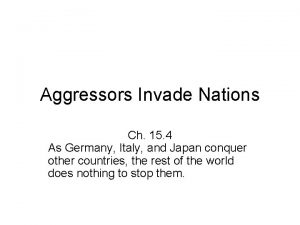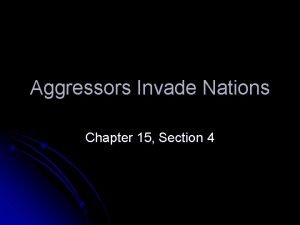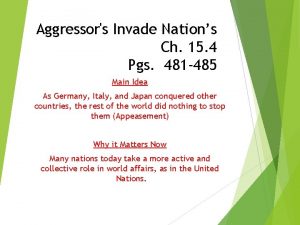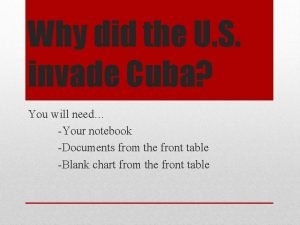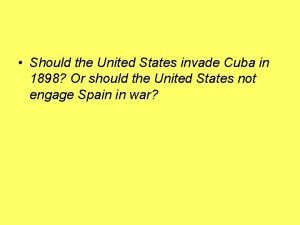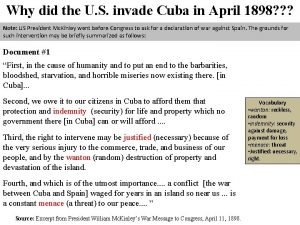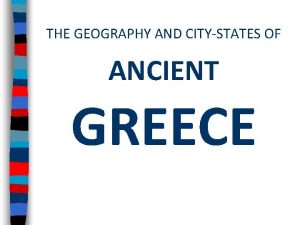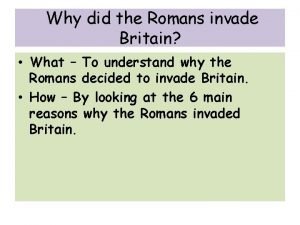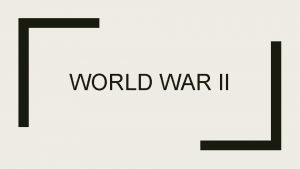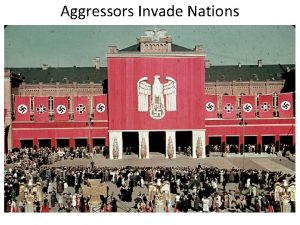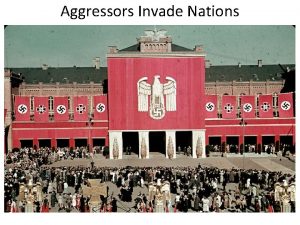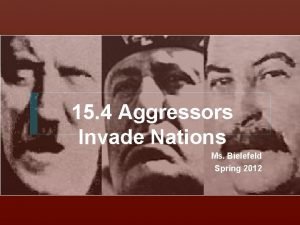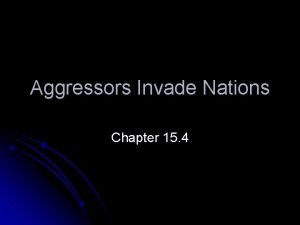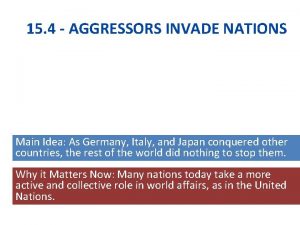Ch 15 S 4 Aggressors Invade Nations Japan














- Slides: 14

Ch. 15 S. 4 – Aggressors Invade Nations Japan Seeks Empire - Japan moved toward democracy in 1920’s, joined League - Constitution had flaws – civilian gov’t had little control of military - Militarists took charge when the Great Depression sparked crisis - Militarists answered to emperor, used him as face of their rule – people loved emperor, went along for the ride - Militarist policy called foreign expansion to fix economy – Planned for Pacific Empire that included China

Emperor Hirohito Hideki Tojo – militarist prime minister

Japanese Invasion of China - 1931 - Japan targeted Manchuria, a region of China, for their first conquest - Japanese exploited Manchurian resources, colonized territory - Members of League of Nations (LON) protested, took no action – Japan quit League, ignored protests - Japan staged attack on their own railroad, blamed China, launched full-scale invasion in 1937 - Japanese ravaged northern cities & capital, Nanjing – slaughtered tens of thousands in “Rape of Nanjing”


ITALIAN INVASION OF ETHIOPIA - 1935 - League of Nations did nothing to stop Japan’s invasion of Manchuria – This encouraged other dictators to get aggressive - 1898 – Ethiopia defeated an invading Italian Army – Mussolini promised to avenge the defeat (militarism/nationalism!) - Ethiopian Emperor Haile Selassie went to League of Nations to Protest – they condemned Italy, but had no army to stop him

Haile Selassie at League of Nations

Hitler’s Aggression before the war: - Annexed Austria unopposed by Austrian forces - invaded Sudetenland - region of Czechoslovakia w/ German population - Britain & France continued appeasement policy - Hitler then took the rest of Czechslovakia

1936 - Hitler Remilitarized the Rhineland

THE SPANISH CIVIL WAR SPAIN - stayed out of WWI: - internal disputes, economic crises of 1920’s bring down the Monarchy - new liberal, democratic gov’t tried to pass radical reforms opponents - Church, army, wealthy - formed fascist party called THE FALANGE PARTY Falange - def - from the word “Phalanx”- (1)a group of people brought together for a certain purpose (2) a battle formation formed by troops

CIVIL WAR - Nationalists (Falange party) vs. Republicans (those who wanted Democracy or Communism) - Francisco Franco - Falange leader - Civil war = ideological struggle - Fascism vs Democracy/Communism - Hitler/ Mussolini helped Fascists - Stalin, some American volunteers helped Republicans - 1939 - Falange won - Fascist dictator Franco ruled until 1975

PROXY WAR - def. - a war instigated by a major power that does not itself become involved Spanish Civil War - A proxy war between Hitler & Stalin Proxy War Today – ISIS (Sunni Arab states) vs Iraq/Syria (Shi’ite States backed by Iran)

Guernica - Pablo Picasso

Guernica - Pablo Picasso - The Spanish Republican gov’t commissioned Picasso to do a painting for the World Fair in Paris, 1937 - the painting became famous for its anti-war message - it brought the world’s attention to the horrors of the Spanish Civil War, German atrocities

Why not take out Hitler earlier? APPEASEMENT - def - to give in to demands in order to avoid a conflict 1. Britain & France wanted peace at any price 2. Economic problems - Br. & Fr. not ready for war 3. Br. /Fr. felt sorry for Germany - guilty over harsh treaty of Versailles 4. Br. /Fr. feared Stalin more - hoped Hitler would act as a barrier to Communism
 Why was the munich conference unsuccessful
Why was the munich conference unsuccessful Chapter 15 section 4 aggressors on the march
Chapter 15 section 4 aggressors on the march Aggressors invade nations
Aggressors invade nations Aggressors invade nations
Aggressors invade nations Why did the us invade cuba
Why did the us invade cuba Raging martians invade venus
Raging martians invade venus Why did romans invade britain
Why did romans invade britain Red martians invade venus
Red martians invade venus Rabbits mate in very unusual expensive gardens
Rabbits mate in very unusual expensive gardens Red martians invade venus using x ray guns
Red martians invade venus using x ray guns Why did the united states invade cuba in 1898?
Why did the united states invade cuba in 1898? Why did the united states invade cuba in 1898?
Why did the united states invade cuba in 1898? Ancient greece geography
Ancient greece geography Red martians invade venus using x ray guns
Red martians invade venus using x ray guns Why did the romans invaded britain
Why did the romans invaded britain
